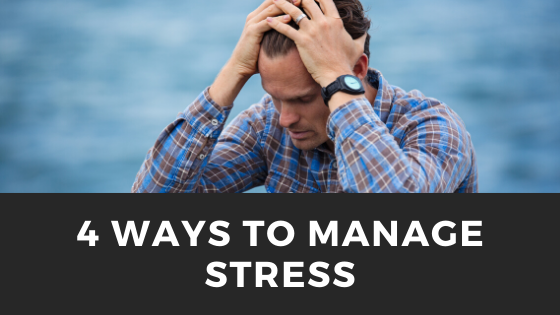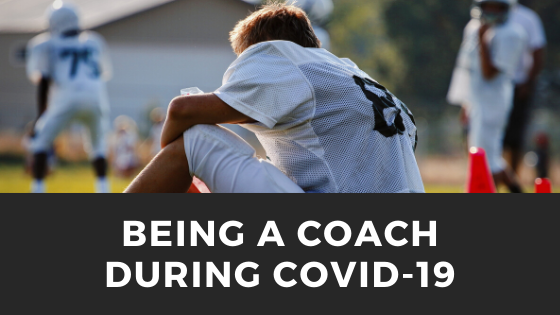.With the amount of uncertainty currently swirling around in the air it is crucial to be able to manage our stress levels. It’s incredibly common to worry. Especially about the future and get lost in the possible “what if” scenarios in the unknown. However, this cycle of thinking is unhelpful, unproductive, and plain stressful.
I have found myself getting caught up in fear-based future thinking. It’s very easy to do, our minds are trained to seek out danger and adjust appropriately.
Fortunately for us, we have the ability to shift our focus to more helpful patterns of thinking. We can adopt strategies to help manage our stress. Here are four very simple science-back methods to manage stress.
Get Active
As a coach, this will always be my first go to point. Get active, get moving, or just do a little more activity than you’re used to. You don’t have to break out all of your workout gear. Or start running a cool 4 miles to get your day started. Research on exercise and happiness suggests that people who do just 10 minutes of physical activity a week experience positive physiological and psychological benefits compared to folks who are not active.
That is the sound of music to my ears. I get excited to know that just a small amount of activity can lead to stress reduction. I recommend going for a walk around your neighborhood. If you have a staircase walk up and down a few times, or look up a short yoga routine on YouTube to follow. Start somewhere and go small, your activity can snowball from there.
If you find yourself being more active you are more likely to build psychological resilience. In a study by published the National Institutes of Health (NIH), college students that participated in physical activity were less like to report poor mental health and perceived less stress compare to their counterparts. The recommended physical activity in this study was 20 minutes of exercise resulting in elevated breathing or sweating, three times a week. That adds up to a total of just one hour of vigorous physical activity a week.
This is further supported in a review of research stating the physical activity is associated with improved well-being. Positive well-being includes positive emotions, increased life satisfaction, and the ability to detach and relax from stressors.
Not only will getting activity help you feel better physically, it will help you combat stress, anxiety, and depression.
Get Outside
The next strategy is to get outside. Right now, most places are under a stay-at-home order, meaning that we are strongly advised not to leave the home for non-essential trips. However, we are still allowed to leave the house. We can leave to get exercise and go on walks while remaining the socially distant. Get outside if you can, even if it’s just in your backyard, up and down the street, or sitting on the front porch.
I currently live in an apartment with my dog. This means I do not have a private backyard or my own porch. But when the sun is out, I make sure that I’m taking full advantage of it. There is a large grass yard that is shared with my neighbors where I can sit and walk (if the weather allows for it) multiple times throughout the day. Living in an apartment with a larger-sized dog may sound like an inconvenience to most people. However this scenario requires that I get outside and walk the dog around.
Exposure to nature enhances your personal resources to manage everyday demands and the pressure of modern life. Research has found that natural settings that include trees, grass, and open spaces have been shown to aid physiological stress reduction. Your body chemistry physically changes with when you are outside in nature. This positive change improves your ability to manage and cope with stress.
Be Mindful
Mindfulness is a word that gets thrown out a lot. There several different and sometimes confusing definitions used. When I use mindfulness with my athletes it is simply the idea of tuning into the present moment with any judgement.
Easier said than done. However, it’s important to recognize it’s not about being perfect. The idea is to notice what is going on externally and internally without getting stuck. Many times, athletes want to go over a mistake they made over and over again. They believe thinking about it more will help them prevent that mistake again. But what is really happening is that they are getting stuck in the past. Getting stuck in the past prevents them from making good decisions in the here-and-now.
This same process happens when we worry or spend too much time going through the “what if” scenarios of the future. In order to move away from getting stuck in the future or the past we must tune into the present.
The NIH reports that mindfulness-based strategies are an effective method of stress management. This is supported by a study of cancer patients, in which mindfulness-based stress reduction techniques were found to reduce both psychological and physiological symptoms related to anxiety and/or stress.
Medical students are a population that has higher rates of depression and psychological distress compared to the average person. In a study of online mindfulness strategies implemented through phone applications, being mindful was found to be effective in decreasing medical student’s experience of stress. This means that if you are interested in guided mindfulness apps or YouTube videos, these online strategies can improve your ability to manage stress.
Show Gratitude
Recently, I have been reading and writing a lot about gratitude. I believe that showing gratitude is undervalued and misunderstood. Gratitude is the appreciation for what you have right now. It’s important not to hyper-focus on monetary value. But also areas of life including loved-ones, colleagues, animals, nature, and life in general.
Research on groups of people who experience high levels of stress have demonstrated that expressing gratitude has numerous benefits. When health care workers completed resilience training which included consistent expression of gratitude, the workers were found to have significant positive improvements in happiness, satisfaction with life, mindfulness, and stress management.
Similarly, in a study of university students, gratitude in combination with other stress management strategies (like mindfulness and physical activity) was found to be significantly effective in reducing stress, increased sense of meaningfulness, and higher engagement in the classroom.
Expression of gratitude is as simple as thinking about what you’re grateful for today. The positive benefits increase if you write it down or share what you’re grateful for with another person. This simple task will bring you into the present moment and improve your stress management.
Conclusion
What is important to note about each of these strategies is that they do not have to happen one at a time. In fact, you could combine all four into a brief section of your day. And by doing so you would receive the maximum benefit.
Get active by getting outside and going for a walk. While you’re walking think about two to three things you’re grateful for day. Be mindful of the present moment, notice the wind, weather, the trees, and grass as you walk around. Tune into how you personally feel, notice your pattern of walking and your emotional experience. In doing so, you are improving your ability to manage stress and improve your resilience.



